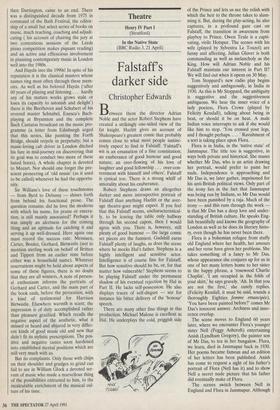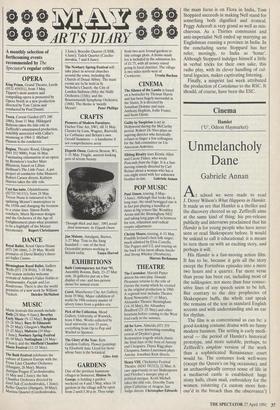Theatre
Henry IV Part I (Stratford)
In the Native State (BBC Radio 3, 21 April)
Falstaff s darker side
Christopher Edwards
Between them the director Adrian Noble and the actor Robert Stephens have created a strikingly one-sided view of the fat knight. Hazlitt gives an account of Shakespeare's greatest comic that probably comes close to what most people instinc- tively expect to find in Falstaff: 'Falstaff s wit is an emanation of a fine constitution; an exuberance of good humour and good nature; an over-flowing of his love of laughter and good fellowship . . . over-con- tentment with himself and others'. Falstaff is cynical too. There is a strong whiff of amorality about his exuberance.
Robert Stephens draws an altogether darker and more introspective portrait of Falstaff than anything Hazlitt or the aver- age theatre-goer might expect. If you feel that this Falstaff seems, uncharacteristical- ly, to be leaving the table only halfway through his second capon, then I would agree with you. There is, however, still plenty of good humour — the large comic set pieces are the funniest. Gadshill earns Falstaff plenty of laughs, as does the scene where he mocks Hal's father. Stephens is a highly intelligent and sensitive actor. Intelligence is of course fine for Falstaff. But how sensitive should he be, or, for that matter how vulnerable? Stephens seems to be playing Falstaff under the permanent shadow of his eventual rejection by Hal in Part II. He lacks self-possession. He also displays traces of self-disgust — see for instance his bitter delivery of the 'honour' speech.
There are many other fine things in this production. Michael Malone is excellent as Hal. He underplays the cold, priggish side of the Prince and lets us see the relish with which the heir to the throne takes to slum- ming it. But, during the play-acting, he also captures, in a profound gaze cast on Falstaff, the transition in awareness from playboy to Prince. Owen Teale is a capti- vating, virile Hotspur. The scenes with his wife (played by Sylvestra Le Touzel) are funny and affecting. Julian Glover is both commanding as well as melancholy as the King. How will Adrian Noble and his Falstaff maintain our interest in Part II? We will find out when it opens on 30 May.
Tom Stoppard's new radio play begins suggestively and ambiguously, in India in 1930. As this is Mr Stoppard, the ambiguity is suggestive and the suggestiveness ambiguous. We hear the inner voice of a lady poetess, Flora Crewe (played by Felicity Kendall), talking about being in heat, or should it be on heat. A male Indian voice interrupts to ask if she would like him to stop. 'You crossed your legs, and I thought perhaps. . . . ' Ravishment of a sort is taking place upon Flora.
Flora is in India, in the 'native state' of Jammapur. The title too is suggestive, in ways both private and historical. She muses whether Mr Das, who is an artist drawing her portrait, would prefer to paint her nude. Independence is approaching and Mr Das is, we later gather, imprisoned for his anti-British political views. Only part of the irony lies in the fact that Jammapur was being run by Indians, so Mr Das would have been punished by a raja. Much of the irony — and this runs through the work is that Mr Das has a deep love and under- standing of British culture. He speaks Eng- lish beautifully and knows the geography of London as well as he does its literary histo- ry, even though he has never been there.
Flora is a bohemian refugee from stuffy old England where her health, her amours and her verse have given her problems. She takes something of a fancy to Mr Das, whose appearance she conjures up for us in one of her many letters home to her sister in the happy phrase, a 'rosewood Charlie Chaplin'. 'I am occupied in the folds of your skirt,' he says gravely. `Ah. In that you are not the first,' she cutely replies. (Felicity Kendall, it must be said, sounds a thoroughly Eighties femme emancipee). `You have been painted before?' comes Mr Das's innocent answer. Archness and inno- cence overlap.
The scene moves to England 60 years later, where we encounter Flora's younger sister Nell (Peggy Ashcroft) entertaining Anish (Lyndham Gregory), the painter son of Mr Das, to tea in her bungalow. Flora, we learn, died in Jammapur back in 1930. Her poems became famous and an edition of her letters has been published. Anish has come to request a sight of his father's portrait of Flora (Nell has it) and to show Nell a secret nude picture that his father did eventually make of Flora.
The scenes switch between Nell in England and Flora in Jammapur. Although the main focus is on Flora in India, Tom Stoppard succeeds in making Nell stand for something both dignified and ironical. Peggy Ashcroft is very grand as well as mis- chievous. As a Thirties communist and anti-imperialist Nell ended up marrying an Englishman running a province in India. In the concluding scene Stoppard has her refer, movingly, to India as 'home'. Although Stoppard indulges himself a little in verbal tricks for their own sake, this radio play, with its clever handling of cul- tural legacies, makes captivating listening.
Finally, a misprint last week attributed the production of Coriolanus to the RSC. It should, of course, have been the ESC.



















































 Previous page
Previous page